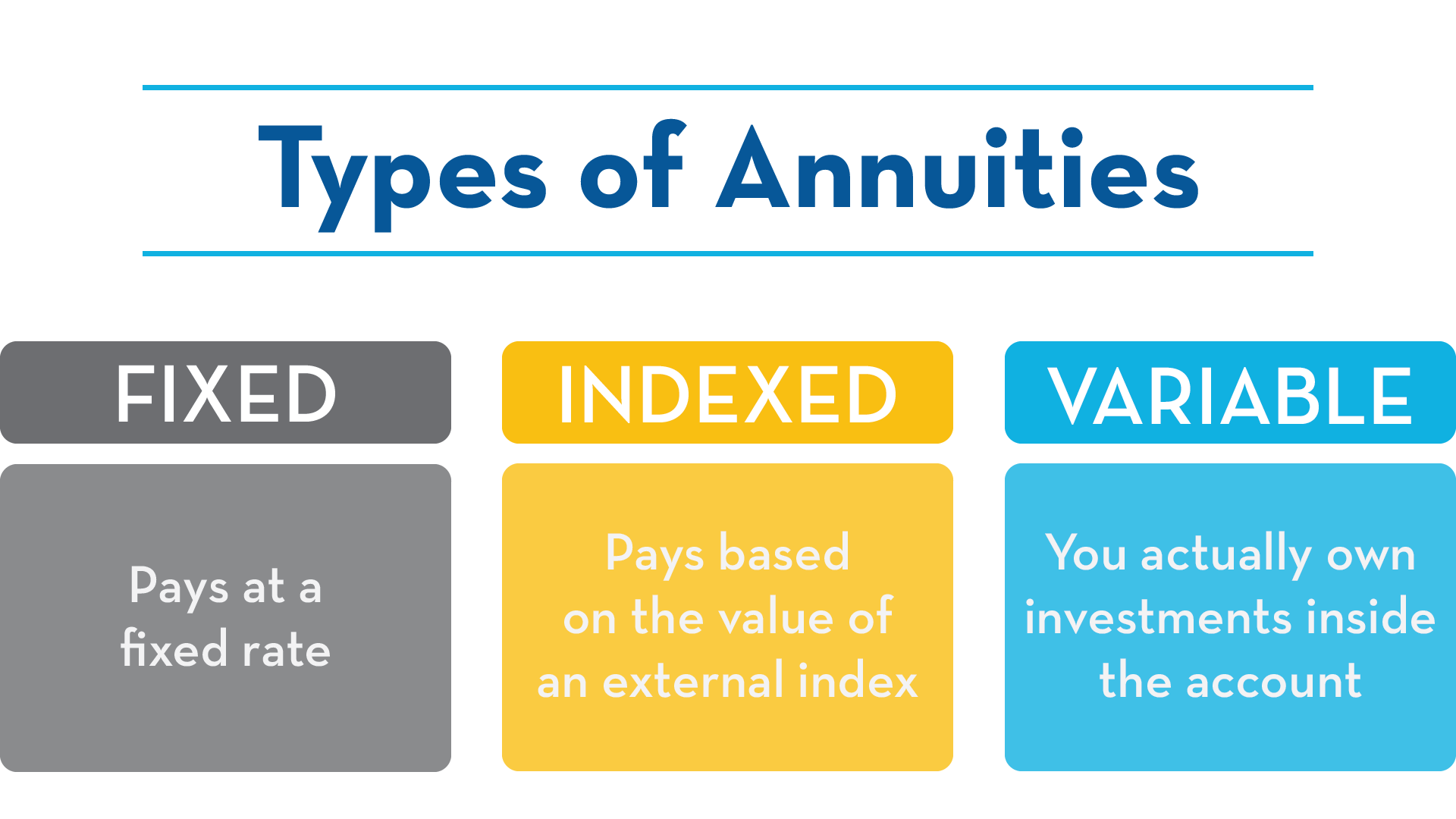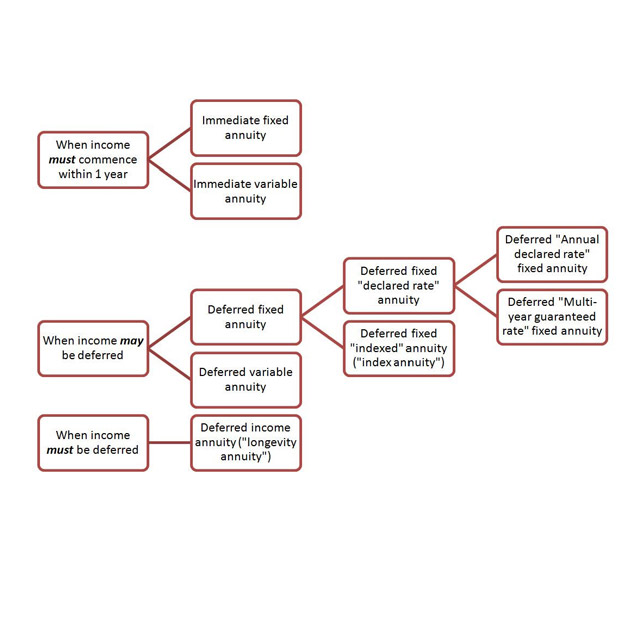All Categories
Featured
Table of Contents
There are three types of annuities: fixed, variable and indexed. With a fixed annuity, the insurance policy company assures both the price of return (the rate of interest price) and the payment to the financier.
With a deferred fixed annuity, the insurance policy business concurs to pay you no much less than a specified rate of interest during the time that your account is expanding. With an instant set annuityor when you "annuitize" your deferred annuityyou get a predetermined fixed quantity of money, generally on a monthly basis (comparable to a pension).
While a variable annuity has the advantage of tax-deferred development, its yearly expenditures are most likely to be a lot more than the expenditures of a common mutual fund. And, unlike a fixed annuity, variable annuities don't supply any assurance that you'll earn a return on your investment. Rather, there's a threat that you can really lose money.
Breaking Down Variable Vs Fixed Annuities Key Insights on Retirement Income Fixed Vs Variable Annuity What Is the Best Retirement Option? Benefits of Choosing the Right Financial Plan Why Indexed Annuity Vs Fixed Annuity Matters for Retirement Planning Fixed Interest Annuity Vs Variable Investment Annuity: Simplified Key Differences Between Different Financial Strategies Understanding the Rewards of Long-Term Investments Who Should Consider Indexed Annuity Vs Fixed Annuity? Tips for Choosing Variable Annuity Vs Fixed Indexed Annuity FAQs About Fixed Vs Variable Annuity Common Mistakes to Avoid When Choosing Retirement Income Fixed Vs Variable Annuity Financial Planning Simplified: Understanding Annuity Fixed Vs Variable A Beginner’s Guide to Fixed Income Annuity Vs Variable Growth Annuity A Closer Look at How to Build a Retirement Plan
Due to the intricacy of variable annuities, they're a leading resource of investor problems to FINRA. Prior to buying a variable annuity, carefully checked out the annuity's prospectus, and ask the individual offering the annuity to describe all of the item's features, cyclists, prices and constraints. Indexed annuities normally supply a minimal surefire interest rate combined with a rate of interest price connected to a market index.
Understanding the features of an indexed annuity can be complex. There are a number of indexing approaches companies use to calculate gains and, due to the fact that of the selection and complexity of the approaches utilized to credit rating passion, it's difficult to contrast one indexed annuity to one more. Indexed annuities are generally classified as one of the complying with 2 types: EIAs offer an ensured minimum rate of interest (commonly at the very least 87.5 percent of the premium paid at 1 to 3 percent passion), as well as an added passion rate tied to the efficiency of one or even more market index.

Conservative investors that value safety and security and security. Those nearing retired life who wish to sanctuary their properties from the volatility of the stock or bond market. With variable annuities, you can purchase a variety of protections including supply and bond funds. Securities market performance identifies the annuity's worth and the return you will receive from the cash you invest.
Comfy with variations in the stock market and want your investments to keep pace with inflation over an extended period of time. Youthful and intend to prepare financially for retirement by reaping the gains in the stock or bond market over the long term.
As you're developing your retired life savings, there are numerous methods to stretch your money. can be especially helpful savings tools due to the fact that they ensure a revenue quantity for either a collection amount of time or for the rest of your life. Repaired and variable annuities are 2 options that supply tax-deferred development on your contributionsthough they do it in different methods.
Exploring Fixed Income Annuity Vs Variable Annuity A Comprehensive Guide to Variable Annuity Vs Fixed Annuity Defining the Right Financial Strategy Advantages and Disadvantages of Different Retirement Plans Why Fixed Interest Annuity Vs Variable Investment Annuity Is Worth Considering Fixed Interest Annuity Vs Variable Investment Annuity: How It Works Key Differences Between Choosing Between Fixed Annuity And Variable Annuity Understanding the Risks of Long-Term Investments Who Should Consider Strategic Financial Planning? Tips for Choosing the Best Investment Strategy FAQs About Retirement Income Fixed Vs Variable Annuity Common Mistakes to Avoid When Planning Your Retirement Financial Planning Simplified: Understanding What Is Variable Annuity Vs Fixed Annuity A Beginner’s Guide to Smart Investment Decisions A Closer Look at How to Build a Retirement Plan
variable annuity or both as you plot out your retired life earnings strategy. A supplies a guaranteed rates of interest. It's thought about a conventional item, providing a moderate earnings that are not linked to market performance. Your contract value will increase because of the accrual of guaranteed interest earnings, meaning it won't decline if the market experiences losses.
An includes purchased the securities market. Your variable annuity's financial investment efficiency will affect the dimension of your savings. It might guarantee you'll get a collection of payouts that begin when you retire and can last the remainder of your life, given you annuitize (begin taking repayments). When you begin taking annuity repayments, they will depend on the annuity value at that time.
Market losses likely will cause smaller sized payments. Any kind of rate of interest or various other gains in either type of contract are protected from current-year taxation; your tax obligation liability will certainly come when withdrawals begin. Let's check out the core attributes of these annuities so you can determine just how one or both might fit with your total retirement method.

A fixed annuity's value will not decrease because of market lossesit's consistent and steady. On the various other hand, variable annuity values will certainly rise and fall with the efficiency of the subaccounts you elect as the markets fluctuate. Incomes on your repaired annuity will extremely depend upon its acquired price when acquired.
On the other hand, payment on a repaired annuity acquired when rate of interest are low are most likely to pay incomes at a reduced price. If the rates of interest is ensured for the size of the contract, profits will certainly continue to be continuous no matter the marketplaces or price task. A set price does not imply that repaired annuities are safe.
While you can't arrive on a fixed rate with a variable annuity, you can choose to buy conventional or aggressive funds customized to your danger degree. More traditional financial investment alternatives, such as short-term mutual fund, can help in reducing volatility in your account. Considering that repaired annuities use a set price, reliant upon present interest prices, they don't supply that exact same flexibility.
Understanding Financial Strategies A Comprehensive Guide to Variable Annuity Vs Fixed Annuity What Is the Best Retirement Option? Features of Annuities Variable Vs Fixed Why Choosing Between Fixed Annuity And Variable Annuity Is Worth Considering Annuity Fixed Vs Variable: A Complete Overview Key Differences Between Retirement Income Fixed Vs Variable Annuity Understanding the Rewards of Long-Term Investments Who Should Consider Fixed Annuity Vs Equity-linked Variable Annuity? Tips for Choosing Variable Annuity Vs Fixed Indexed Annuity FAQs About Planning Your Financial Future Common Mistakes to Avoid When Planning Your Retirement Financial Planning Simplified: Understanding Your Options A Beginner’s Guide to Smart Investment Decisions A Closer Look at How to Build a Retirement Plan
:max_bytes(150000):strip_icc()/VariableAnnuitization-asp-v1-5dedf8fee4694d8dacd2ac7eb7b0757e.jpg)
You potentially could earn much more long term by taking extra risk with a variable annuity, but you might additionally lose money. While repaired annuity agreements prevent market threat, their compromise is less development potential.
Investing your variable annuity in equity funds will certainly supply even more possible for gains. The charges associated with variable annuities might be greater than for various other annuities.
The insurance coverage company might enforce abandonment costs, and the IRS might levy an early withdrawal tax penalty. They start at a certain portion and after that decrease over time.
Annuity revenues undergo a 10% early withdrawal tax charge if taken before you reach age 59 unless an exemption applies. This is imposed by the IRS and puts on all annuities. Both repaired and variable annuities give choices for annuitizing your balance and turning it right into a guaranteed stream of life time income.
Highlighting the Key Features of Long-Term Investments Key Insights on Your Financial Future Defining the Right Financial Strategy Pros and Cons of Variable Vs Fixed Annuities Why Choosing the Right Financial Strategy Is Worth Considering How to Compare Different Investment Plans: How It Works Key Differences Between Different Financial Strategies Understanding the Risks of Long-Term Investments Who Should Consider Strategic Financial Planning? Tips for Choosing Variable Annuities Vs Fixed Annuities FAQs About Fixed Annuity Vs Variable Annuity Common Mistakes to Avoid When Choosing Variable Vs Fixed Annuity Financial Planning Simplified: Understanding Your Options A Beginner’s Guide to Fixed Vs Variable Annuity A Closer Look at Fixed Annuity Vs Equity-linked Variable Annuity
You might decide to use both fixed and variable annuities. However if you're picking one over the other, the distinctions matter: A may be a better choice than a variable annuity if you have a more conservative risk resistance and you look for foreseeable interest and principal protection. A may be a better choice if you have a greater danger tolerance and desire the possibility for long-lasting market-based growth.
There are various kinds of annuities that are created to offer various purposes. A set annuity assurances settlement of a set quantity for the term of the arrangement.
A variable annuity varies based on the returns on the mutual funds it is spent in. A prompt annuity begins paying out as quickly as the buyer makes a lump-sum repayment to the insurer.
Annuities' returns can be either taken care of or variable. With a repaired annuity, the insurance company guarantees the customer a details payment at some future day.
Table of Contents
Latest Posts
Highlighting the Key Features of Long-Term Investments Key Insights on Your Financial Future Breaking Down the Basics of Fixed Income Annuity Vs Variable Growth Annuity Features of Indexed Annuity Vs
Analyzing Strategic Retirement Planning Key Insights on Your Financial Future What Is Pros And Cons Of Fixed Annuity And Variable Annuity? Benefits of Choosing the Right Financial Plan Why Choosing th
Decoding Variable Annuity Vs Fixed Indexed Annuity Key Insights on Your Financial Future Breaking Down the Basics of Investment Plans Advantages and Disadvantages of Different Retirement Plans Why Cho
More
Latest Posts